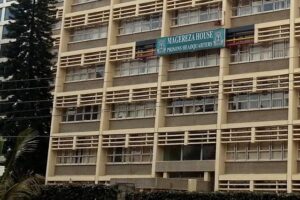The recent leak of financial documents has unveiled a web of wealth and influence among several high-profile Kenyan politicians and business leaders, exposing their extensive investments in real estate in Dubai.
This revelation has sent mixed reactions through public discourse, particularly due to the involvement of Rashmi Chamanlal Kamani and Deepakkumar Chamanlal Kamani, who have been implicated in this massive scandal.
According to the post on X by Cyprian Is Nyakundi, the leaked documents reveal that the Kamanis acquired seven properties in Dubai between 2007 and 2011, with a total worth running into millions of dollars.
Rashmi Kamani reportedly owns luxury office units and apartments in prestigious areas such as Palm Jumeirah and Marina Residences, amounting to at least Ksh 2 billion (approximately $15.57 million).
Deepakkumar Kamani’s investments also include office units valued at Ksh 76 million ($589,400) in Tiffany Towers.
This level of investment raises serious questions about the sources of their wealth, especially considering their previous entanglement in the infamous Anglo Leasing scandal, which involved fraudulent government procurement contracts.
The implications of this leak extend beyond individual accountability.
It reflects a broader narrative about wealth accumulation among Kenya’s elite, particularly in overseas real estate.
The findings suggest that Dubai continues to be a favored location for investment among affluent Kenyans, often driven by its lax regulations and low taxation, which appeal to those seeking to safeguard their assets or launder money.
The nature of property transactions in the UAE is often criticized for its minimal oversight, which can facilitate illicit financial flows.
Moreover, the Dubai property market has been described as a haven for individuals with questionable backgrounds, including politicians and business figures implicated in various scandals.
This trend poses big risks to the integrity of financial systems both locally and internationally.
For instance, the ease with which individuals can purchase high-value properties in Dubai without extensive background checks raises concerns regarding potential money laundering activities.
The Kamani family’s prior controversies further complicate their narrative.
They have been under scrutiny for years due to their connection to government corruption scandals, particularly the Anglo Leasing case that saw the misappropriation of public funds.
The fact that they continue to invest heavily in international real estate amidst ongoing allegations has led to calls for more rigorous oversight of the financial activities of public figures.
The leak has reignited discussions about corruption, accountability, and the necessity for comprehensive reforms in how wealth is declared and monitored, especially for those in power.
Kenyan authorities may need to take a closer look at the asset declarations of public officials and implement stricter regulations on overseas investments to curb potential misuse of public resources and restore public trust.
The revelations about the Kamanis and other Kenyan elites involved in Dubai’s real estate market underscore the need for transparency and accountability in governance.
It remains to be seen how Kenyan authorities will respond to these allegations and whether they will take action to address the underlying issues of corruption and financial misconduct among the country’s elite.





















Add Comment